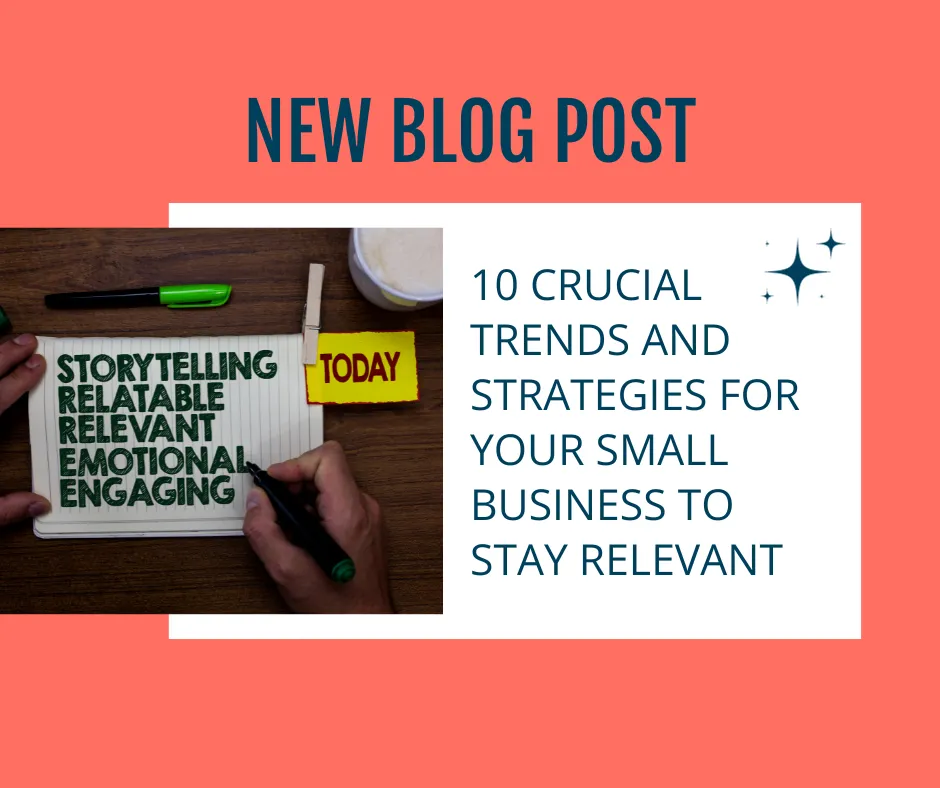Let's Make Your Brand Unforgettable
At Brammer Social Marketing we believe in empowering businesses with the knowledge and tools they need to thrive. This blog is an extension of this belief, created to provide you with a wealth of information right at your fingertips.
Whether you're a startup looking to make your mark, a mid sized company aiming to scale, or an established brand exploring new horizons, this blog is your go-to resource.

How Businesses Can Stay Relevant in 2024
How You Can Keep Your Brand Relevant in 2024
In the ever-evolving digital landscape of 2024, small businesses face the challenge of staying relevant and competitive. The key to staying relevant lies in adapting to the emerging digital marketing trends that are shaping our consumers saviour and expectations.
With that said, let's dive into the 10 most crucial trends and strategies that can help small businesses thrive and stay relevant in 2024! 👊
1. Embrace AI, but Keep it Human
2023 was definitely the year of AI as it became a lot more accessible to us as small businesses. AI offers unprecedented efficiency and data-driven insights, it can handle repetitive tasks, analyse large data sets for trend and even predict customer behaviours. However what we cannot do is lose the human element of our brand, it's crucial in understanding nuances and maintaining customer relationships, and for small businesses especially, this is vital. While we can use AI to personalise emails, human creativity is needed for compelling storytelling and brand authenticity. The synergy of AI's power and human empathy can create a dynamic marketing strategy for 2024.
2. Rethink the Role of Social Media
The role of traditional social media in driving traffic to your website is declining and this means we need to be ready to pivot. As small businesses, instead of relying solely on social media to drive traffic, we should think about how we can diversify across multiple digital platforms - including emerging ones - as these can open new avenues for engagement and customer acquisition.
This could mean investing in SEO to improve organic search visibility, engaging in email marketing or exploring platforms we aren't already on but where our target audience is moving to. By not putting all of your digital eggs into one basket you can reduce the risk of platform-specific algorithm changes and create a more resilient online brand.
3. Leverage LinkedIn for B2B Success
LinkedIn has evolved and its significance in B2B marketing is growing, offering a platform not just for networking but also for lead generation, brand positioning and thought leadership. For small businesses who are targeting other businesses, LinkedIn provides a professional network to share expertise and establish brand authority.
Crafting articles, networking, participating in industry conversations and engaging in relevant groups, and utilising LinkedIn Ads are strategies that can amplify a small businesses presence in the B2B space.
4. Value Over Ads
This is the era of ad fatigue.People are less interested in traditional ads and more in content that adds value. Content amplification becomes a smarter way to engage our audiences. As small businesses we should focus on creating and promoting content that provides value, informs or entertains, rather than pushing products.
This approach resonates better with consumers who prefer engaging with content that aligns with their interests or solves their problems. By amplifying value content, rather than just pushing products, small businesses can build a loyal audience, improve brand perception and indirectly drive sales and leads.
5. Prioritise First-Party Data
With growing privacy concerns and the phasing out of third-party cookies, collecting first-party data is more important than ever. First-party data is collected directly from customers through interactions, purchases, or website visits, offers rich insights into customer preferences and behaviours.
In 2024, using this data responsibly and effectively can enable small small businesses to tailor marketing efforts, create personalised experiences and make data-driven decisions. This approach not only enhances customer engagement but it also aligns with the growing concern for privacy and data security.
6. Adopt Generative Search Experience
Search engines are becoming a lot more sophisticated with Generative AI. Generative Search Experience offers a more personalised and interactive way for our customers to discover our products and services. For small businesses, optimising this new search paradigm means ensuring our content is easily discoverable and relevant to the evolving search behaviours.
In 2024, focusing on creating quality content, leveraging AI tools for SEO, and understanding the nuances of AI-driven search engines will be key to improving online visibility and attracting targeted traffic.
7. Focus on Account-Based Marketing for B2B
ABM is a strategy where marketing efforts are tailored to specific accounts or customer segments. For B2B small businesses, account-based marketing offers a higher ROI by targeting specific decision-makers with tailored messaging, leading to higher conversion rates and efficient resource allocation.
Creating customised marketing campaigns that resonate with the specific needs and challenges of those prospects helps to foster deeper relationships with your potential clients, offering a more focused and effective approach than broad-based marketing tactics.
8. Navigate the Evolving MarTech Landscape
The technology landscape is vast and it can be overwhelming. In 2024, being able to identify and select the right tools for your needs is crucial. These tools can automate tasks, provide valuable insights and enhance customer engagement.
Keep up to date with trends and keep yourself informed about new technologies, assessing how they align with your marketing strategies and your business objectives. Adopting the right mix of technology can lead to more efficient operations and better customer experiences.
9. Capitalise on Social Commerce
Social commerce is booming - and for small businesses integrating social commerce into your e-commerce strategy can tap into the platforms where your audience spend a significant amount of time, and money.
In 2024 social commerce is going to be even more prevalent, and leveraging platforms like Instagram and TikTok can provide a seamless shopping experience for your customers, increase brand visibility and drive sales.
10. Personalisation - the Heart of Marketing
For small businesses, personalisation means going beyond generic messages to creating tailored experiences for customers. Leveraging all of the above trends and strategies allows small business to create marketing messages that resonate deeply with your customers, fostering a really genuine connection.
Hyper-personalisation leads to deeper customer engagement, loyalty and an increase in conversions. Effectively personalise your marketing efforts and you can differentiate yourself in a crowded marketplace.
Explain Generative Search Experience
Imagine Generative Search Experience as a super-smart assistant in your business, who knows everything about what you sell and what your customers might need. When a customer asks a question, this assistant doesn't just point to an aisle or hand over a product. Instead, it listens carefully to what the customer is saying, figures out exactly what they need, and then gives them a tailored answer or suggestion.
Now, think of this happening on your website or online store. When people search for something, instead of just showing a list of products or articles like a normal search, it understands their questions better and can even give them custom responses. It's like having a conversation with your customers through the search bar.
For your business, this means you can help your customers more effectively. They find what they're looking for faster and easier, and they get answers that feel more personal and relevant to them. This can make them happier with your service and more likely to buy from you.
FREE DOWNLOAD
Headline that hooks people in, gets them excited and makes them want to sign up.
© Copyright 2022 Brammer Social Marketing.
Transforming your brand with cutting-edge strategy.
